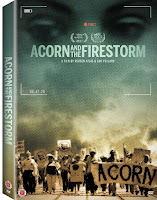the traveler's resource guide to festivals & films
a FestivalTravelNetwork.com site
part of Insider Media llc.
Film and the Arts
May '18 Digital Week V
- Details
- Parent Category: Film and the Arts
- Category: Reviews
- Published on Tuesday, 29 May 2018 19:58
- Written by Kevin Filipski
Beyond the Hills
(Warner Bros)
(Cohen Film Collection)
(Strand)
The Imaginative Worlds of “Firebird” & “AFTERITE”
- Details
- Parent Category: Film and the Arts
- Category: Reviews
- Published on Friday, 25 May 2018 16:18
- Written by Jack Angstreich

May '18 Digital Week IV
- Details
- Parent Category: Film and the Arts
- Category: Reviews
- Published on Thursday, 24 May 2018 20:19
- Written by Kevin Filipski
CDs of the Week
Béla Bartók—Violin Concertos Nos. 1 & 2 (Ondine)
The violin concertos of Béla Bartók (1881-1945), separated by 30 years, are the works of first a youthful virtuoso gaining his footing and then of a sublime master.
That’s not to say that the first concerto (1908) is in any way inferior; in soloist Christian Tetzlaff’s dazzlingly capable hands, it’s a beguiling, buoyant piece of music (Bartók wrote it for a young woman violinist he was head over heels for), while the second concerto (1938) is, simply, a mesmerizing masterpiece. Both are played with great feeling by Tetzlaff and the Finnish Radio Symphony Orchestra, conducted by Hannu Lintu.
William Walton—Viola Concerto and Other Works (Chandos)
William Walton (1902-1983) has a reputation as a facile composer who penned Laurence Olivier’s Shakespeare scores and royal coronation marches, but his output was far more wide-ranging and substantial than that. The works on this disc combine his facility for memorable melodies with his skill for equal parts darkness and light.
The impassioned Viola Concerto, despite being revised twice—the second time more than 30 years after it was first composed in 1929—manages to retain a completeness all its own, buoyed by soloist James Ehnes’ lovely playing. The Sonata for String Orchestra—a transcription of his own A Minor Quartet—and Partita for Orchestra alternate between verve and lyricism; conductor Edward Gardner and the BBC Symphony Orchestra bring out the works’ musicality.
Mieczyslaw Weinberg/Dmitry Kabalevsky—Concertos (Capriccio)
The remarkable renaissance continues for Russian composer Mieczyslaw Weinberg (1918-1996), who has gone from nearly unknown to towering genius thanks to a flurry of recordings and performances over the past decade or so. This disc pairs his striking and lyrical Violin Concerto (1959)—played with apt vigorousness by Benjamin Schmid—with two attractive concertos by another under-the-radar Russian, Dmitry Kabalevsky (1904-1987), Weinberg’s contemporary in the Soviet music sphere.
Claire Huangci dispatches the lively 1961 Piano Fantasy (after Schubert’s solo piano classic) with tuneful ease, while Harriet Krijgh makes the most of the melodious Cello Concerto No. 1 (1948-9). Cornelius Meister sensitively leads the ORF Vienna Radio Symphony Orchestra in all three works.
"Giselle" Dazzles at American Ballet Theater
- Details
- Parent Category: Film and the Arts
- Category: Reviews
- Published on Monday, 21 May 2018 15:20
- Written by Jack Angstreich

The new season at American Ballet Theater opened strongly with its very first performance on the evening of Monday, May 14th, a marvelous presentation of the beloved Giselle —one of the oldest surviving ballets—set to the immortal, melodious score by Adolphe Adam, with a libretto by the esteemed French writer, Théophile Gautier, after a retelling of a Slavic legend by the great German poet, Heinrich Heine. The ravishing choreography is after that of Jean Coralli, Jules Perrot and Marius Petipa and the current staging is by the company’s director, Kevin McKenzie, with unusually attractive scenography by Gianni Quaranta, appealing costumes by Anna Anni, and effective lighting by Jennifer Tipton.
More Articles...
Newsletter Sign Up

















